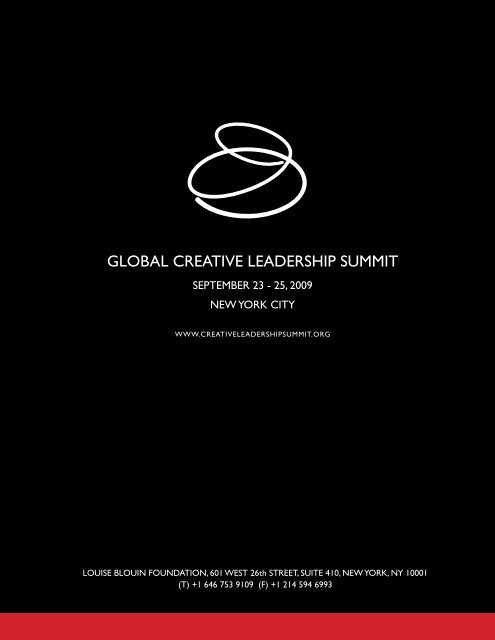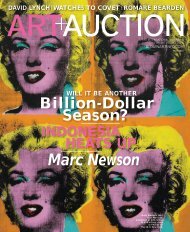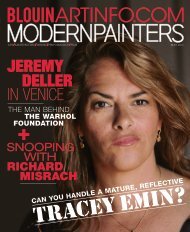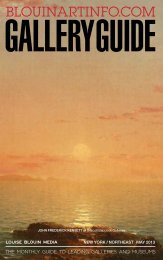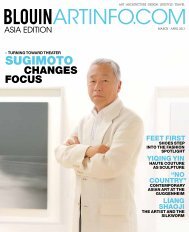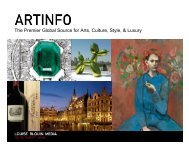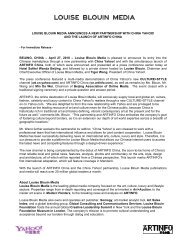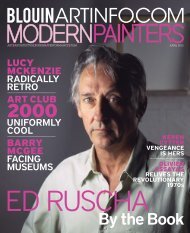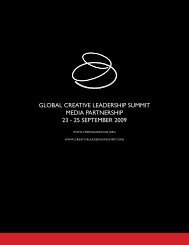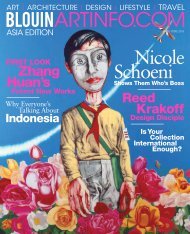GLOBAL CREATIVE LEADERSHIP SUMMIT - Artinfo
GLOBAL CREATIVE LEADERSHIP SUMMIT - Artinfo
GLOBAL CREATIVE LEADERSHIP SUMMIT - Artinfo
Create successful ePaper yourself
Turn your PDF publications into a flip-book with our unique Google optimized e-Paper software.
THE <strong>GLOBAL</strong> <strong>CREATIVE</strong> <strong>LEADERSHIP</strong> <strong>SUMMIT</strong><br />
www.creativeleadershipsummit.org<br />
LOUISE BLOUIN FOUNDATION<br />
<strong>GLOBAL</strong> <strong>CREATIVE</strong> <strong>LEADERSHIP</strong> <strong>SUMMIT</strong><br />
SEPTEMBER 23 - 25, 2009<br />
NEW YORK CITY<br />
WWW.<strong>CREATIVE</strong><strong>LEADERSHIP</strong><strong>SUMMIT</strong>.ORG<br />
LOUISE BLOUIN FOUNDATION, 601 WEST 26th STREET, SUITE 410, NEW YORK, NY 10001<br />
(T) +1 646 753 9109 (F) +1 214 594 6993<br />
LOUISE BLOUIN FOUNDATION
FOUNDER’S NOTE<br />
Welcome. The Global Creative Leadership Summit, now in its fourth year, is a three-day think tank and discussion forum aimed at addressing<br />
the challenges and the opportunities that confront us in our era of globalization. The Summit brings together a multidisciplinary cast of world<br />
leaders who provide insight into such international issues as the financial crisis and climate change while sharing the best practices of their<br />
respective fields and proposing practical solutions. A key feature of this forum, and what turns innovative ideas into concrete action, is the<br />
engagement and support of heads of state, leaders of global agencies and CEOs, who are able to utilize the Summit discussions in managing<br />
the domestic and global concerns of their country, business or agency.<br />
The Summit is committed to presenting innovative and creative approaches to the world’s pressing problems. Issues such as climate change,<br />
poverty in Africa and conflict in the Middle East cannot be solved by political or economic means alone, but rather require an awareness of<br />
cultural values, as well as the participation of science and technology in bridging long-standing divides and bringing about sustainable economic<br />
and social development. For instance, how can climate change be addressed without creating new political covenants, green technologies and<br />
competitive industries? How can poverty in Africa be alleviated without a simultaneous emphasis on education, trade and industrial development<br />
leveraging science and technology? How can conflict in the Middle East can be mediated without taking into account the culture and<br />
traditions of the Arab and Islamic world and the great value it places on land and religion?<br />
The Summit’s principal objective is to develop practicable solutions to these and other global issues that combine an understanding of cultural<br />
and ethical values with scientific and technological innovations, while acknowledging the global implication of local actions and the importance<br />
of trade and economic development in bringing hope and dignity to communities and helping them realize their aspirations.<br />
Cultural and Ethical Values<br />
THE <strong>GLOBAL</strong> <strong>CREATIVE</strong> <strong>LEADERSHIP</strong> <strong>SUMMIT</strong><br />
www.creativeleadershipsummit.org<br />
The Summit is unique in recognizing the role of culture in foreign policy, scientific research and economic development. For instance, in 2006<br />
the Foundation commissioned the OECD to conduct research into the importance of culture to the well-being of cities and nations. The study<br />
found that cultural industries accounted for between 3.1 and 5.8 percent of the GDP of Australia, Canada, France, the United Kingdom and<br />
the United States and between 98,000 (in Montreal) and 525,000 (in London) city jobs.<br />
As for the importance of culture to scientific research, during the 2007 and 2008 Summits, the Nobel laureate Sir Paul Nurse and Dr. Robert<br />
Ridley, of the World Health Organization, stated that to address African nations’ local medical needs and ensure the health of the continent,<br />
it is not sufficient to rely on the distribution of medicines developed in the West for Western populations. Rather, the only viable long-term<br />
approach is to develop local research capabilities to seek solutions to culturally specific problems.<br />
With respect to foreign policy, it is evident that America’s lack of respect for Arab and Islamic culture has fueled radicalization and conflict in<br />
the Middle East. By instigating a war in Iraq and turning a blind eye to the Palestinians’ plight, the United States, the world’s leading nation and<br />
one that aspires to be a model for others, has lost allies and support within the region. What is required to bring peace to the Middle East and<br />
repair America’s reputation is a new foreign policy that shows fairness and evenhandedness to all the nations and political groups rather than<br />
privileging one—that is, a new policy based on cultural understanding and respect.<br />
LOUISE BLOUIN FOUNDATION
THE <strong>GLOBAL</strong> <strong>CREATIVE</strong> <strong>LEADERSHIP</strong> <strong>SUMMIT</strong><br />
www.creativeleadershipsummit.org<br />
Ethical values are also crucial in addressing the challenges of globalization, since they provide a framework for determining what is a correct action.<br />
In retrospect, it is glaringly obvious that greed at all levels contributed to the global financial crisis. Banks were willing to lend to unqualified<br />
borrowers so they could repackage the mortgages as securities and sell them, using the proceeds to feed their bottom lines and make new<br />
investments. Borrowers, meanwhile, were glad to take on the debt, assuming their homes would continue to rise in value, and the regulatory<br />
agencies saw no harm in the practice as long as everyone was making money. None of the parties involved questioned the soundness of the<br />
foundations of the enterprise. We are now bitterly aware that those foundations were shaky, and individuals who did scrutinize the system have<br />
not only avoided losses, but actually benefited from the melt-down. Trust is necessary for the financial system to work and contribute to longterm<br />
economic well being, and trust requires transparency and accountability in all business, political, cultural and economic transactions.<br />
Scientific and Technological Innovation<br />
At the Summit, leading figures in science and technology participate alongside heads of state, policymakers and economists in inventing new<br />
solutions to global issues. For instance, Nobel laureate Dr. Eric Kandel and Dr. Antonio Damasio, leading researchers in the field of neuroscience,<br />
have demonstrated not only how understanding the brain can help in developing new educational techniques, but also how our emotions<br />
affect decision making and thus foreign policy. In the area of technology, Nicholas Negroponte has shown how his One Laptop Per Child<br />
project, which provides children in impoverished regions lacking sound education systems with basic computers, increases the recipients’ ability<br />
to learn and grow.<br />
Building on the Summit’s findings, the Foundation is working with engineers from Google and Wikipedia on the LINK Project, an online search<br />
engine and data repository for international aid agencies, NGOs and philanthropic organizations. The goal is to facilitate information sharing<br />
and collaboration on the ground by allowing participants to identify similar development programs and areas of focus. LINK will also increase<br />
aid agencies’ accountability and strengthen their efforts by enabling Internet users to rank them and comment on their work.<br />
The Impact of Local Policies on Global Affairs<br />
A theme running through the Summit is the role of globalization in making individuals and nations more interdependent and interconnected.<br />
For instance, the food crisis of the summer of 2008 can be attributed in part to crop failure in Australia, lower yields in Canada and distribution<br />
constraints in Southeast Asia, all of which boosted prices worldwide, leading to riots in India and Africa. Similarly, although the terrorist attacks<br />
of September 11, 2001 occurred in the United States, they involved individuals from more than 12 countries funded and directed by Al Qaeda.<br />
Finally, the most recent Doha round of trade talks was derailed by the $320 billion farm bill passed by the U.S. Congress during the spring of<br />
2008, which included $17 billion in direct subsidies at the very time Indian and Brazilian representatives to Doha were negotiating to lower<br />
such subsidies to between $12 billion and $15 billion. Although the amount was not significant in terms of the overall bill, it showed that local<br />
politics were more important than a global covenant beneficial to both the developed and the developing worlds.<br />
Each of these examples is local in impact or origin, but all have global ramifications. Accordingly, national governments must craft policies that<br />
go beyond local constituencies to address the global political, economic or social situation. At the same time, individuals operating at the global<br />
level, in particular heads of international agencies, must provide leadership and guidance for promulgating sound policies that take into account<br />
worldwide concerns. This need to coordinate between local and global levels applies not only to economics and security, but also to trade, development,<br />
poverty alleviation and climate change. Since weather-related catastrophes are unpredictable and affect populations across borders,<br />
since weapons of mass destruction are becoming more accessible and transportable, since prolonged poverty can create unrest in Africa with<br />
the potential to spread outside the continent, national leaders and leaders of global agencies must make greater efforts to work together.<br />
LOUISE BLOUIN FOUNDATION
Trade and Economic Development<br />
Trade and economic development have been the most effective instruments of poverty alleviation during the past 20 years, with almost half<br />
the gains made in China. They can play a similar role in Africa and also aid in defusing protracted regional conflicts such as those in the Middle<br />
East. This is because economic development not only enables greater consumption, but gives individuals, groups and communities hope and<br />
tools to better their situation. A major problem in Gaza and the West Bank, beyond the continued fighting, is the Palestinians’ inability to grow<br />
their own economy through export and trade. This lack of control has resulted in feelings of hopelessness and loss of dignity, with many taking<br />
up arms as the only solution.<br />
The Doha Round trade talks were initiated by the United States shortly after September 11, 2001 in the belief that greater openness, sharing<br />
and trade will increase prosperity in developing and developed nations alike, persuading those in need to realize their potential rather than<br />
turn to violence and terrorism. Although difficult to realize in a trade agreement, as we have seen over the past several years, this ambition<br />
still speaks to the central role of trade and economic development in enabling individuals and communities to better themselves and work<br />
together to reach their goals. It is only through cooperation and mutual support and trust that we can truly turn such challenges as the financial<br />
crisis, climate change, terrorism and poverty in Africa into opportunities.<br />
With a multidisciplinary approach emphasizing culture, science, policy and economics, the Global Creative Leadership Summit seeks to identify<br />
best practices and generate innovative solutions to the challenges of globalization. Our aim is to provide a forum for discussion and reflection<br />
among leaders of global agencies, industry, science, technology and the arts as well as heads of state to better prepare countries, corporations<br />
and individuals for our present and future challenges.<br />
We simply cannot afford to maintain the status quo. Our primary obstacle is the difficulty of replacing or transforming methods we have<br />
become accustomed to over decades. How can we develop measures to avoid rather than create emergencies, of which the global financial<br />
crisis is only the latest instance?<br />
If we do not halt climate change, not only will our ecosystem and economy suffer harm, but the brunt of that harm will be borne by those in<br />
the developing world. If we do not address African poverty, we risk exacerbating conflict and strife lasting generations. If we do not bring the<br />
Middle East conflict to a peaceful conclusion, there will be greater radicalization and terror. These are not someone else’s problems; they affect<br />
all of us—our well-being and our collective security. By working together at the local and global levels, we may steer through our current crises<br />
and develop sound policies, corporations, institutions and practices to carry us into the future.<br />
I hope you can join us at the 2009 Global Creative Leadership Summit this September.<br />
Sincerely,<br />
Louise Blouin MacBain<br />
Founder and Chairman<br />
Louise Blouin Foundation<br />
THE <strong>GLOBAL</strong> <strong>CREATIVE</strong> <strong>LEADERSHIP</strong> <strong>SUMMIT</strong><br />
www.creativeleadershipsummit.org<br />
LOUISE BLOUIN FOUNDATION
TABLE OF CONTENTS<br />
THE <strong>GLOBAL</strong> <strong>CREATIVE</strong> <strong>LEADERSHIP</strong> <strong>SUMMIT</strong><br />
www.creativeleadershipsummit.org<br />
Louise Blouin Foundation p. 6<br />
Global Creative Leadership Summit p. 8<br />
Global Creative Leadership Summit Discussion Topics p. 10<br />
Global Creative Leadership Summit – 2008 Participants p. 17<br />
Louise Blouin Foundation – Further Info p. 26<br />
Louise Blouin Foundation – Initiatives p. 29<br />
Louise Blouin Foundation – Regional Commitments p. 34<br />
LOUISE BLOUIN FOUNDATION
THE <strong>GLOBAL</strong> <strong>CREATIVE</strong> <strong>LEADERSHIP</strong> <strong>SUMMIT</strong><br />
THE LOUISE BLOUIN FOUNDATION<br />
www.creativeleadershipsummit.org<br />
The Louise Blouin Foundation is an international not-for-profit organization that was founded in 2005 with the goal<br />
of supporting heads of state in their efforts to make globalization work for their citizens and helping global agencies<br />
manage cooperation within the global system. The Foundation acts as a think tank for heads of state, as well as for<br />
leaders in science, business, culture and politics, in order to share best practices and develop innovative solutions<br />
for pressing social, economic, environmental and security challenges at the local and global levels.<br />
The Foundation’s work is multidisciplinary, inclusive and based on innovative partnerships where culture plays<br />
a privileged role in addressing critical global issues. Through its work, the Foundation aims to find new ways to<br />
increase opportunities for collaboration on development, to reduce antagonism and to improve the quality and<br />
dignity of life for people and communities around the world.<br />
The Foundation’s mission consists of a number of strategic initiatives that are both thematically oriented and regionally<br />
focused.<br />
Foundation Thematic Initiatives:<br />
The Foundation is focused on supporting research and discussion forums on culture and creativity, neuroscience,<br />
education, Internet technology and foreign policy. The Foundation aims:<br />
• to emphasize and support the role of cultural understanding and dialogue within diplomatic and political<br />
processes<br />
• to identify the impact of creativity on the brain through advances in neuroscience<br />
• to work with leaders in the information and technology sectors to develop innovative online tools and<br />
solutions to address global gaps in development<br />
• to develop strategies and responses to foreign policy issues that are global in scope such as global<br />
security and terrorism, the reform and retooling of global agencies, the environment and geo-economics.<br />
The Foundation also administers the Louise Blouin Institute, an exhibition and educational space that houses the<br />
Foundation’s work in London, U.K. The Institute presents the work of individual artists in temporary exhibitions,<br />
installations, performances and screenings. Further, the Institute promotes a lively program of lectures, debates and<br />
workshops related to the Foundation’s areas of interest.<br />
LOUISE BLOUIN FOUNDATION
THE <strong>GLOBAL</strong> <strong>CREATIVE</strong> <strong>LEADERSHIP</strong> <strong>SUMMIT</strong><br />
www.creativeleadershipsummit.org<br />
ABOUT THE LOUISE BLOUIN FOUNDATION<br />
Foundation Regional Initiatives:<br />
The Foundation is focused on supporting development and diplomatic efforts in Africa, China, the Middle East and<br />
Russia:<br />
• to support economic and social progress<br />
• to support strategic decision making in international security and global relations<br />
• to harness science and technology in multisectoral problem solving<br />
• to protect the environment and natural resources<br />
The Foundation is fast becoming one of the primary centers in a global network of statesmen and Nobel laureates,<br />
CEOs and engineers, policy makers and individuals who share its core belief in the importance of culture and in the<br />
boundless creative potential of the human mind.<br />
Further information can be found at: www.ltbfoundation.org<br />
LOUISE BLOUIN FOUNDATION
THE <strong>GLOBAL</strong> <strong>CREATIVE</strong> <strong>LEADERSHIP</strong> <strong>SUMMIT</strong><br />
www.creativeleadershipsummit.org<br />
ABOUT THE <strong>GLOBAL</strong> <strong>CREATIVE</strong> <strong>LEADERSHIP</strong> <strong>SUMMIT</strong><br />
Since 2005, the Louise Blouin Foundation, with the support of the United Nations Office for Partnerships, has<br />
organized the annual Global Creative Leadership Summit to identify and implement solutions based on<br />
international best practices to the challenges arising from globalization.<br />
The Summit brings heads of state together with representatives of global agencies and 120 leaders in the areas of<br />
science, technology, culture, business and politics. Together the delegates address the interconnected threats and<br />
challenges of the 21st century through multidisciplinary exchanges that place cultural dialogue and understanding<br />
at the fore. The open, constructive discussion facilitates the creation of cross-cultural networks committed to<br />
change and transformative action.<br />
The Summit encourages collaboration across disciplines in an effort to spark creative thinking and to ultimately<br />
develop innovative approaches to global problems. The Summit focuses on issues as diverse as emerging global<br />
security threats, climate change, foreign policy and education, with specific attention to development and foreign<br />
policy concerns in Africa, China, Russia and the Middle East.<br />
Over the past three years, the Summit has been honored to feature President José Manuel Barroso, of the European<br />
Commission; Prime Minister Jan Peter Balkenende, of the Netherlands; President Ólafur Ragnar Grímsson, of<br />
the Republic of Iceland; President Bharrat Jagdeo, of Guyana; President Stjepan Mesic of Croatia; President Bingu wa<br />
Mutharika, of Malawi; Secretary General Jaap de Hoop Scheffer, of NATO; and President Manuel Zelaya, of Honduras.<br />
In addition, the Summit has hosted a variety of distinguished international leaders, such as Nobel laureate Eric<br />
Kandel; anthropologist Jane Goodall; business leaders Harold Burson, founder of Burson-Marsteller; Henry Silverman,<br />
CEO of Realogy Corp., Craig Barrett, chairman of Intel and Lex Fenwick, CEO of Bloomberg, along with Riz<br />
Khan of Al Jazeera; David Boies, chairman of Boies, Schiller & Flexner and UNICEF executive director Ann Veneman.<br />
A full listing of Summit participants from 2008 can be found at:<br />
http://www.creativeleadershipsummit.org/speakers/speakers.php<br />
The Summit has been covered by a wide-range of media, including CNN, Al Jazeera, the Financial Times, The Economist,<br />
the BBC, and the International Herald Tribune. Although this is an intimate event, with only 120 delegates,<br />
the Summit proceedings are Web cast live and, its conclusions shape thinking, create new projects and stimulate<br />
debate across the globe. The Summit proceedings and commitments are also written up in a white paper available<br />
for download from the Summit Website.<br />
Further information can be found at: www.creativeleadershipsummit.org<br />
LOUISE BLOUIN FOUNDATION
THE <strong>GLOBAL</strong> <strong>CREATIVE</strong> <strong>LEADERSHIP</strong> <strong>SUMMIT</strong><br />
www.creativeleadershipsummit.org<br />
<strong>GLOBAL</strong> <strong>CREATIVE</strong> <strong>LEADERSHIP</strong> <strong>SUMMIT</strong> SPONSORSHIP<br />
OPPORTUNITIES<br />
The Louise Blouin Media group’s collaboration with the Foundation has established a 12-month program for<br />
potential sponsors and advertisers. Both the Summit Gala and the panel discussion sessions scheduled for the 2009<br />
Summit may be sponsored by corporations.<br />
Corporate sponsors are given the opportunity to engage in workshops and participate in proactive discussions<br />
with global stakeholders in both the private and public sectors at the Global Creative Leadership Summit. Further<br />
opportunities for exposure are available through live blogs and Webcasts of panel discussions, as well as through<br />
publicity on the Global Creative Leadership Summit and Louise Blouin Foundation Web sites.<br />
Global Creative Leadership Summit Gala and Awards Ceremony<br />
An annual Gala and Awards Ceremony is held during the Creative Leadership Summit to honor four individuals who<br />
have displayed creative leadership in their address of pressing global issues. In 2008, the Louise Blouin Foundation<br />
had the privilege to honor President Bingu wa Mutharika, of Malawi; Craig Barrett, chairman of Intel Corp.; Nobel<br />
laureate and geneticist Sir Paul Nurse; and acclaimed theater director, Peter Sellars of UCLA. Past Louise Blouin<br />
Foundation honorees include Former President Bill Clinton, Eli Broad, Jeff Koons, Richard Meier, Renée Fleming,<br />
Richard Axel, Sir Clive Gillinson, Dr. Eric Kandel, and Jimmy Wales, among others.<br />
The Gala enables 320 guests to develop a relationship with the Louise Blouin Foundation and honor the awardees.<br />
The Gala also provides a high-profile opportunity for sponsors to represent their brands and to contribute to the<br />
aims of the Louise Blouin Foundation and the Global Creative Leadership Summit.<br />
The White Paper<br />
The white paper is the document of record for global commitments made during the annual Global Creative<br />
Leadership Summit. All the initiatives undertaken by the Foundation are linked to the Summit and are recorded in<br />
the document. The 2008 Global Creative Leadership Summit white paper will present the proposals that came out<br />
of the Summit in a comprehensive yet accessible manner. The document is a manual for action, capturing the key<br />
issues raised in the 19 panels held over three days. The 2008 white paper will be available in early 2009.<br />
Global Creative Leadership Summit Website<br />
As part of the sponsorship package offered to corporations, sponsor logos and banner ads may be placed on the<br />
Global Creative Leadership Summit Web site. The placement of a corporate logo on the Web site not only provides<br />
the corporation with exposure to a sophisticated audience, it also associates the company with the high-profile<br />
LOUISE BLOUIN FOUNDATION
THE <strong>GLOBAL</strong> <strong>CREATIVE</strong> <strong>LEADERSHIP</strong> <strong>SUMMIT</strong><br />
www.creativeleadershipsummit.org<br />
<strong>GLOBAL</strong> <strong>CREATIVE</strong> <strong>LEADERSHIP</strong> <strong>SUMMIT</strong> DISCUSSION TOPICS<br />
Corporations can sponsor specific panel topics at the Global Creative Leadership Summit, according to their interest<br />
and orientation. Corporations also have the opportunity to place their CEO, chairman or a senior executive on a<br />
panel to address, alongside other participants, the panel topic. Because of the high-level of the Summit’s concerns<br />
participation is limited to the most senior officers of a company.<br />
The general topics and panel sessions to be included in the 2009 Global Creative Leadership Summit are as<br />
follows.<br />
Global Threats and Opportunities<br />
Following up on the topics of 2008, the 2009 Global Creative Leadership Summit will open with an extended panel<br />
on the threats and opportunities facing the globe over the next 20 years. This session has a broad scope addressing<br />
not only economic questions, but also Energy, Health, Security, Commodities and Demographics. The<br />
Summit seeks to identify emerging threats and opportunities to best confront present and future challenges.<br />
Geo-Economics<br />
Global Finance<br />
Economic Development and Entrepreneurship<br />
The Future of the Corporation<br />
Geo-economics and global economic trends play an important role in the Global Creative Leadership Summit. The<br />
Summit attempts to identify the key future challenges and opportunities for Global Finance, Commodities<br />
and Economic Development and Entrepreneurship. The geo-economic sessions attempt to address not<br />
only the global financial crisis, but also how emerging economies can develop to become further integrated within<br />
the world system. The Summit also asks what The Future of the Corporation will look like and how corporations<br />
need to function in order to thrive within the context of global flows of goods, capital, and people.<br />
Trade<br />
Trade, from the Doha Development Round of the World Trade Organization to the creation of<br />
regional and bilateral trade agreements, is a core focus of the Summit. While trade appears to be a development<br />
‘solution’ in Africa and the Middle East, and in Palestine in particular, the creation of a new global trade agreement<br />
in the form of an updated Doha text or other more advanced agreement is seen as essential to meet the economic<br />
and commodity/resource needs of the global economy.<br />
LOUISE BLOUIN FOUNDATION
THE <strong>GLOBAL</strong> <strong>CREATIVE</strong> <strong>LEADERSHIP</strong> <strong>SUMMIT</strong><br />
www.creativeleadershipsummit.org<br />
<strong>GLOBAL</strong> <strong>CREATIVE</strong> <strong>LEADERSHIP</strong> <strong>SUMMIT</strong> DISCUSSION TOPICS<br />
Innovation<br />
Internet and New Technology<br />
Despite being seen as commonplace today, information technology continues to transform businesses, governments,<br />
social relationships, commerce and the way we understand ourselves and our neighbors. The Summit investigates<br />
the innovative potential of IT and its impact at the local and global levels.<br />
Global Health<br />
Genomics<br />
Biological Components of Behavior<br />
Research Capacity and Development<br />
As part of ongoing research efforts and involvement with the sciences, the Global Health session aims to address<br />
research in genomics and how new developments in synthetic and computational biology can help cure<br />
cancer, Alzheimer’s and serious epidemics. The subject of Biological Components of Behavior plays a key<br />
role within the context of Global Health, as well as in many other Summit panels, since neuroscience has much<br />
to tell us regarding emotion, behavior and decision-making processes that is applicable to other disciplines. Research<br />
Capacity and Development and the ability of the scientific and medical communities to adapt and<br />
develop research programs that are tailored to the needs of local communities are part of the critical discussions<br />
in the Global Health session.<br />
Education, Creativity and the Mind<br />
The Summit brings together leaders in neuroscience, the arts, sports and education to identify the best practices<br />
to promote mental, physical and social development so individuals can creatively address the challenges of the 21st<br />
century. This panel is intimately related to the Foundation’s interest in understanding how neurological processes,<br />
at every stage of life relate to individuals’ ability to learn, create and understand one other. This Summit session<br />
lasts some four hours and brings together a multidisciplinary spectrum of thinkers on human development to address<br />
the issue.<br />
LOUISE BLOUIN FOUNDATION
THE <strong>GLOBAL</strong> <strong>CREATIVE</strong> <strong>LEADERSHIP</strong> <strong>SUMMIT</strong><br />
www.creativeleadershipsummit.org<br />
<strong>GLOBAL</strong> <strong>CREATIVE</strong> <strong>LEADERSHIP</strong> <strong>SUMMIT</strong> DISCUSSION TOPICS<br />
Global Security<br />
Emerging Threats<br />
Human Security<br />
As evidenced by the terror attacks of September 11, 2001, devastation on a mass scale can be carried out with<br />
relatively small means and be coordinated from the other side of the globe. Furthermore, the Internet and global<br />
telecommunications, as well as advances in the biological and computer sciences, make it more possible than ever<br />
for security threats to emerge from unconventional locations. The Summit asks how to defend against Emerging<br />
Threats while preserving the liberties critical to a democratic global community.<br />
The Summit also addresses issues of Human Security and Human Rights. Under these topics, the Summit<br />
looks at how best to stop drug and human trafficking, provide peace, security and justice to those afflicted by war<br />
and build institutional infrastructure to empower local and national governments.<br />
Environment<br />
Climate Change vs. Economic Growth<br />
The debate on climate change and the protection of the environment plays a central role in the Summit since it<br />
concerns not only how nations can reduce greenhouse gas emissions, but how a transition to cleaner energy sources<br />
can be made economically viable. This debate, like those concerning many other topics at the Summit, focuses<br />
on the consequences of inaction in a situation where the challenge is understood and practical solutions<br />
have been proposed. This session brings together scientists and policy makers as well as entrepreneurs engaged in<br />
funding, testing and deploying new technologies and new industries.<br />
LOUISE BLOUIN FOUNDATION
THE <strong>GLOBAL</strong> <strong>CREATIVE</strong> <strong>LEADERSHIP</strong> <strong>SUMMIT</strong><br />
www.creativeleadershipsummit.org<br />
<strong>GLOBAL</strong> <strong>CREATIVE</strong> <strong>LEADERSHIP</strong> <strong>SUMMIT</strong> DISCUSSION TOPICS<br />
Foreign Policy<br />
New Global Order<br />
Global Agencies<br />
Philanthro-Capitalism<br />
Foreign policy and geopolitical concerns at both the local and global levels are important focuses of the Summit.<br />
The Summit acknowledges the dramatic change in the balance of global power due to the incremental rise Brazil,<br />
Russia, India and China, as well as the increasing challenges to American power resulting in part from its unilateral<br />
engagements after September 11, 2001. Therefore a key task of the Summit is to map out changes in global relations<br />
and to develop an understanding of the emerging new global order.<br />
Central to the discussion of globalization are foreign policy and global relations, as the Foundation believes there<br />
are no ‘far-off’ crises in a world of interconnected threats and challenges. Among other questions, this discussion<br />
asks what the consequences are of not taking the ‘right’ action to solve many of the world’s problems, such as the<br />
Israel/Palestine conflict or prolonged and persistent poverty in Africa. Unlike other forums, the Summit draws attention<br />
to the role of neuroscience and the understanding of emotions in the decision-making process, an emerging<br />
area of research vital to the development of new techniques for conflict resolution and the avoidance of war.<br />
Within this general investigation, the Summit seeks to identify how global agencies can reinvent themselves<br />
to better manage a world that is becoming increasingly interdependent, yet constantly fraught with conflict and<br />
inequality. Further, the Summit asks what role innovative and private-sector approaches to the philanthropic<br />
enterprise can play in addressing global challenges.<br />
Cultural Diplomacy<br />
Cities, Culture and Globalization<br />
Culture Beyond Borders<br />
The Foundation places special emphasis on culture as a vehicle for greater understanding, interaction and exchange<br />
with the ‘other’. There is increasing evidence that cultural institutions and the culture industries – art galleries,<br />
museums, architecture – play an important role in promoting the well-being of cities, as well as in the relations<br />
and interactions among communities, ethnic groups and nations. The notion of Culture Beyond Borders is a<br />
defining concept for the Summit since culture is seen not simply confined to aesthetics, but is deeply connected<br />
to history, identity and politics.<br />
LOUISE BLOUIN FOUNDATION
THE <strong>GLOBAL</strong> <strong>CREATIVE</strong> <strong>LEADERSHIP</strong> <strong>SUMMIT</strong><br />
www.creativeleadershipsummit.org<br />
<strong>GLOBAL</strong> <strong>CREATIVE</strong> <strong>LEADERSHIP</strong> <strong>SUMMIT</strong> DISCUSSION TOPICS<br />
Regional Spotlight<br />
Africa<br />
The theme of African development, trade and economics are central both to the Summit and to the efforts of the<br />
Louise Blouin Institute. The Africa roundtable is an extended session lasting approximately four hours and in the<br />
past has featured in-depth discussion of African development needs between heads of state, leading CEOs and<br />
figures from the NGO world, educators and economists involved in development work. The session is used to<br />
identify potential solutions for Africa, based on best practices put forward by delegates.<br />
Beyond this Summit session devoted to Africa, the Louise Blouin Foundation has launched an investment-and-technology<br />
initiative for Africa, to generate greater direct foreign investment, as well as to help maximize the efforts of<br />
NGOs and global agencies on the ground. [See Regional Initiatives section for more information.]<br />
Regional Spotlight<br />
Russia<br />
Russia is a key emerging economy of global importance not only because of its vast resource wealth but because<br />
of its position on the world stage, where it exerts significant influence in Eastern Europe and Central Asia. Russia<br />
therefore must be viewed as a vital and strategic partner in addressing global issues, whether they are related to<br />
energy security, the nonproliferation of weapons of mass destruction or the raising of living standards throughout<br />
the region. The Summit’s focus on Russia addresses the nation’s vital role in the international community.<br />
As part of its regional focus on Russia, and to encourage openness and cultural exchange, the Louise Blouin Foundation<br />
will host an exhibition in collaboration with Pace Wildenstein Gallery of works by the artist Louise Nevelson,<br />
and another exhibition of new Russian contemporary art, in the fall of 2009 in London. [See Regional Initiatives<br />
section for more information]<br />
LOUISE BLOUIN FOUNDATION
THE <strong>GLOBAL</strong> <strong>CREATIVE</strong> <strong>LEADERSHIP</strong> <strong>SUMMIT</strong><br />
www.creativeleadershipsummit.org<br />
<strong>GLOBAL</strong> <strong>CREATIVE</strong> <strong>LEADERSHIP</strong> <strong>SUMMIT</strong> DISCUSSION TOPICS<br />
Regional Spotlight<br />
China<br />
China has witnessed a profound opening up over the past 30 years as a result of the American diplomatic effort of<br />
détente. During this period, China has developed into an economic super power, exerting influence on Asia, Africa<br />
and around the globe. The Summit provides a forum to discuss this new era of Chinese openness, economic<br />
development and cultural exchange. It will also examine the country’s influence on commodity markets<br />
as well as its relationship with Africa.<br />
To encourage cultural exchange between China and the West, and foster greater understanding, respect and<br />
mutual support, the Louise Blouin Foundation launched the China Cultures Fund, to support Tibetan and Chinese<br />
culture at the international level. [See Regional Initiatives section for more information.]<br />
Regional Spotlight<br />
Middle East<br />
The Middle East has been marked by tension resulting from September 11, 2001, the Iraq War, the conflict between<br />
Israel and Palestine and the emergence of Iran as a regional power. However, many recent developments,<br />
such as the emergence of the Emirates as major global centers of architecture, culture tourism and finance, as<br />
well as Saudi Arabia’s heavy investment in similar areas, have created a new dynamic within the region. The Summit<br />
addresses the twin issues of economic development and cultural dialogue in the Middle East, identifying<br />
ways to lower tension and to build a sustainable peace. [See the Regional Initiatives section for further information.]<br />
Regional Spotlight<br />
India<br />
India is on track to be the information technology superpower of the 21st century. Considering the country’s<br />
successes in developing its hi-tech sector and its groundbreaking systems of microfinance, microcredit and microhealth,<br />
the Summit asks what India can teach us that can be replicated elsewhere. The country’s rapid development,<br />
though, poses challenges to India’s government such as how to ensure equitable development that achieves economic<br />
growth and fosters entrepreneurship without leaving millions behind.<br />
LOUISE BLOUIN FOUNDATION
THE <strong>GLOBAL</strong> <strong>CREATIVE</strong> <strong>LEADERSHIP</strong> <strong>SUMMIT</strong><br />
www.creativeleadershipsummit.org<br />
<strong>GLOBAL</strong> <strong>CREATIVE</strong> <strong>LEADERSHIP</strong> <strong>SUMMIT</strong> DISCUSSION TOPICS<br />
Global Creative Leadership Summit Gala and Awards Ceremony<br />
As part of the Global Creative Leadership Summit annual Gala and Awards Ceremony is held in order to honor<br />
four individuals who have displayed ‘creative leadership’ in their address of pressing global issues. In 2008 the Louise<br />
Blouin Foundation had the privilege to honor: President Bingu wa Mutharika of Malawi, Chairman of Intel Corp.<br />
Craig R. Barrett, Nobel Laureate and geneticist Sir Paul Nurse and acclaimed theatre director, UCLA<br />
Professor Peter Sellars. Past Louise Blouin Foundation award recipients include: Former President Bill Clinton,<br />
Eli Broad, Jeff Koons, Richard Meier, Renée Fleming, Richard Axel, Sir Clive Gillinson, Eric Kandel, and Jimmy Wales,<br />
among others.<br />
Prime Minister Ivo Sanader of Croatia Shaukat Aziz, Former Prime Minister of Pakistan<br />
LOUISE BLOUIN FOUNDATION
THE <strong>GLOBAL</strong> <strong>CREATIVE</strong> <strong>LEADERSHIP</strong> <strong>SUMMIT</strong><br />
www.creativeleadershipsummit.org<br />
<strong>GLOBAL</strong> <strong>CREATIVE</strong> <strong>LEADERSHIP</strong> <strong>SUMMIT</strong> - 2008 PARTICIPANTS<br />
Heads of State<br />
Shaukat Aziz Former Prime Minister of Pakistan<br />
Prime Minister Jan Peter<br />
Balkenende<br />
Prime Minister of the Kingdom of the Netherlands<br />
President Olafur Ragnar<br />
Grimsson<br />
President of the Republic of Iceland<br />
President Bharrat Jagdeo President of the Republic of Guyana<br />
President Bingu wa<br />
Mutharika<br />
President of the Republic of Malawi<br />
President José Ramos-Horta President, Democratic Republic of Timor-Leste<br />
Prime Minister Ivo Sanader Prime Minister of the Republic of Croatia<br />
President Manual Zelaya<br />
Rosales<br />
President of the Republic of Honduras<br />
President Olafur Ragnar Grimsson of Iceland President Bingu wa Mutharika of Malawi<br />
LOUISE BLOUIN FOUNDATION
THE <strong>GLOBAL</strong> <strong>CREATIVE</strong> <strong>LEADERSHIP</strong> <strong>SUMMIT</strong><br />
www.creativeleadershipsummit.org<br />
<strong>GLOBAL</strong> <strong>CREATIVE</strong> <strong>LEADERSHIP</strong> <strong>SUMMIT</strong> - 2008 PARTICIPANTS<br />
Diplomatic and Non-Governmental Leaders<br />
Dr. Parvez Ahmed Former Chair, Council on American-Islamic Relations<br />
Dr. Seth Berkley President, International AIDS Vaccine Initiative<br />
Graciana del Castillo Associate Director, Center on Capitalism and Society<br />
Antonio Maria Costa Executive Director, UNODC<br />
Dr. Jacques Diouf Director-General, UNFAO<br />
Jane Goodall Founder, Jane Goodall Institute<br />
Dr. Allan Goodman President, Institute of International Education<br />
Dr. William Haseltine Chairman, Haseltine Global Health<br />
Stephen Heintz President, Rockefeller Brothers Fund<br />
Fred Mednick Founder, Teachers Without Borders<br />
Prime Minister Jan Peter Balkenede of the Kingdom<br />
of the Netherlands<br />
President Bharrat Jagdeo of Guyana<br />
LOUISE BLOUIN FOUNDATION
THE <strong>GLOBAL</strong> <strong>CREATIVE</strong> <strong>LEADERSHIP</strong> <strong>SUMMIT</strong><br />
www.creativeleadershipsummit.org<br />
<strong>GLOBAL</strong> <strong>CREATIVE</strong> <strong>LEADERSHIP</strong> <strong>SUMMIT</strong> - 2008 PARTICIPANTS<br />
Diplomatic and Non-Governmental Leaders<br />
Luis Moreno-Ocampo Prosecutor, International Criminal Court<br />
Nicholas Negroponte Founder and Chairman of One Laptop per Child<br />
Kenneth Roth Executive Director, Human Rights Watch<br />
Warren Sach Assistant Secretary-General, Controller, UN<br />
Guy Sebban Secretary General, International Chamber of Commerce<br />
Dr. Ismail Serageldin Director, Bibliotheca Alexandrina, Egypt<br />
K.A. Taipale Senior Fellow, World Policy Institute<br />
Ann Veneman Executive Director, UNICEF<br />
Jimmy Wales Founder, Wikipedia<br />
Jennifer Windsor Executive Director, Freedom House<br />
Dr. Kandeh Yumkella Director-General, UNIDO<br />
Lord Mark Malloch Brown and Luis Moreno-Ocampo,<br />
Prosecutor, International Criminal Court<br />
Dr. Kandeh Yumkella, Director-General,<br />
UNIDO<br />
LOUISE BLOUIN FOUNDATION
THE <strong>GLOBAL</strong> <strong>CREATIVE</strong> <strong>LEADERSHIP</strong> <strong>SUMMIT</strong><br />
www.creativeleadershipsummit.org<br />
<strong>GLOBAL</strong> <strong>CREATIVE</strong> <strong>LEADERSHIP</strong> <strong>SUMMIT</strong> - 2008 PARTICIPANTS<br />
Innovators from the Academic World<br />
Thomas Malone Professor of Management, MIT Sloan School of Management<br />
Robert Beauregard Professor of Urban Planning, Columbia University<br />
Lord Paul Bew Chair of Irish Politics, Queen’s University, Belfast<br />
Homi K. Bhabha Director, Humanities Center, Harvard University<br />
Colin Blakemore Professor of Neuroscience, Oxford University<br />
Richard Bulliet Professor of History, Columbia University<br />
Andrea Califano Professor of Biomedical Informatics, Columbia University<br />
John Henry Clippinger Senior Fellow, Berkman Center, Harvard University<br />
António Damásio Professor of Neuroscience, USC<br />
Padma Desai Professor of Comparative Economic Systems, Columbia University<br />
Vishakha Desai President and CEO, Asia Society<br />
Peter Fonagy Professor of Psychoanalysis, University College London<br />
Majid Fotuhi Director, Center for Memory and Brain Health<br />
Howard Gardner Professor of Cognition and Education, Harvard Graduate School<br />
Dr. Eric Kandel Professor of Biochemistry and Biophysics, Columbia University<br />
Nancy Kanwisher Professor of Cognitive Nueroscience, MIT<br />
Pradeep Khosla Professor and Dean of Engineering, Carnegie Mellon<br />
Vladimir Kvint President, International Academy of Emerging Markets<br />
Itamara V. Lochard Senior Researcher, the Fletcher School<br />
Leonard Mlodinow Professor of Physics, Caltech<br />
Sir Paul Nurse President, Rockefeller University<br />
Stephen Pacala Professor of Ecology and Evolutionary Biology, Princeton University<br />
Arvind Panagariya Professor of Economics, Columbia University<br />
LOUISE BLOUIN FOUNDATION
THE <strong>GLOBAL</strong> <strong>CREATIVE</strong> <strong>LEADERSHIP</strong> <strong>SUMMIT</strong><br />
www.creativeleadershipsummit.org<br />
<strong>GLOBAL</strong> <strong>CREATIVE</strong> <strong>LEADERSHIP</strong> <strong>SUMMIT</strong> - 2008 PARTICIPANTS<br />
Innovators from the Academic World<br />
Edmund Phelps Professor of Political Economy, Columbia University<br />
Michael Prather Professor of Earth System Science, University of California, Irvine<br />
Lisa Randall Professor of Physics, Harvard University<br />
Falguni Sen Professor of Management Systems, Fordham University<br />
Richard Silberstein Professor of Neuroscience, Swinburne University<br />
John Stein Professor of Physiology, Oxford University<br />
Evgeny Velikhov President, Kurchatov Institute<br />
Linton Wells II Force Transformation Chair, National Defense University<br />
Torsten Wiesel Professor of Neurobiology, Rockefeller University<br />
Larry Young Professor of Neuroscience, Emory University<br />
Jonathan Zittrain Professor of Internet Law, Harvard Law School<br />
John Henry Clippinger, Senior Fellow,<br />
Harvard University<br />
LOUISE BLOUIN FOUNDATION<br />
Sir Paul Nurse, President of The Rockefeller University
THE <strong>GLOBAL</strong> <strong>CREATIVE</strong> <strong>LEADERSHIP</strong> <strong>SUMMIT</strong><br />
www.creativeleadershipsummit.org<br />
<strong>GLOBAL</strong> <strong>CREATIVE</strong> <strong>LEADERSHIP</strong> <strong>SUMMIT</strong> - 2008 PARTICIPANTS<br />
Participating Members from the International Business Community<br />
Lex Fenwick CEO, Bloomberg Ventures<br />
Craig R. Barrett Chairman, Intel Corporation<br />
Stanley Bergman Chairman and CEO, Henry Schein<br />
David Boies Chairman, Boies, Schiller & Flexner<br />
Harold Burson Founding Chairman, Burson-Marsteller<br />
Stewart Butterfield Cofounder, Flickr<br />
Kaj den Daas Chairman, Philips Lighting NA<br />
Edward Dolman CEO, Christie’s International<br />
David Fenton Founder and CEO, Fenton Communications<br />
Morel Fourman CEO, Gaisoft<br />
Jeffrey Friedberg Chief Trust Architect, Microsoft<br />
Alan Hassenfeld Chairman, Hasbro<br />
Lord Michael Hastings Global Head of Citizenship and Diversity, KPMG<br />
Robert Hormats Vice Chairman, Goldman Sachs<br />
Dr. Mohan Kaul Director General, Commonwealth Business Council<br />
Leonid Makaron President, Pronto-Moscow<br />
Dr. Amit Mitra Secretary General, FICCI<br />
Dambisa Moyo Head of Economic Research and Strategy for Africa, Goldman Sachs<br />
Craig Newmark Founder, Craigslist<br />
Richard O’Neill Sr. President, Highlands Group<br />
Alayne Reesberg Owner, Reesberg Partners LLC<br />
John Rendon Jr. CEO and President, the Rendon Group<br />
Richard Robb CEO, Christofferson, Robb & Company<br />
LOUISE BLOUIN FOUNDATION
THE <strong>GLOBAL</strong> <strong>CREATIVE</strong> <strong>LEADERSHIP</strong> <strong>SUMMIT</strong><br />
www.creativeleadershipsummit.org<br />
<strong>GLOBAL</strong> <strong>CREATIVE</strong> <strong>LEADERSHIP</strong> <strong>SUMMIT</strong> - 2008 PARTICIPANTS<br />
Participating Members from the International Business Community<br />
Marko Saravanja Founder and CEO, Regenesys Business School, South Africa<br />
Henry Silverman Chairman and CEO, Reology Corporation<br />
John Studzinksi Senior Managing Director, the Blackstone Group<br />
Martin Varsavsky Founder and CEO, FON<br />
Jody Westby CEO, Global Cyber Risk<br />
Lord Mark Malloch-Brown UK Minister for Africa, Asia and the UN<br />
B.J. Panda Member of the Parliament, India<br />
Sheikha Lubna Al Qasimi Minister for Economy and Planning, United Arab Emirates<br />
N.K. Singh Member of Parliament, India<br />
Sheikha Lubna Al Qasimi, Minister of Foreign Trade,<br />
United Arab Emirates<br />
LOUISE BLOUIN FOUNDATION<br />
Craig R. Barrett, Chairman, Intel Corporation
THE <strong>GLOBAL</strong> <strong>CREATIVE</strong> <strong>LEADERSHIP</strong> <strong>SUMMIT</strong><br />
www.creativeleadershipsummit.org<br />
<strong>GLOBAL</strong> <strong>CREATIVE</strong> <strong>LEADERSHIP</strong> <strong>SUMMIT</strong> - 2008 PARTICIPANTS<br />
Pioneers in Global Media<br />
David Andelman Editor, World Policy Journal<br />
Matthew Bishop Chief Business Writer, The Economist<br />
Juan Luis Cebrian Editor in Chief, El Pais<br />
Raghida Dergham Senior Diplomatic Correspondent, Al-Hayat<br />
Lane Greene International Correspondent, The Economist<br />
Riz Khan TV host, Al Jazeera English<br />
Jared Kushner Publisher, the New York Observer<br />
Femi Oke Contributor and Interviewer, WNYC’s The Takeaway<br />
Michael Oreskes Managing Editor for U.S. News, Associated Press<br />
Ned Parker Baghdad Correspondent, the Los Angeles Times<br />
Bill Roedy Chairman and CEO, MTV Networks International<br />
Vijay Vaitheeswaran Correspondent, The Economist<br />
Ali Velshi Chief Business Correspondent, CNN<br />
Lally Weymouth Senior Editor, Newsweek<br />
Dr. Gino Yu Cofounder, PolyU MERECL<br />
Lex Fenwick, CEO Bloomberg Ventures Matthew Bishop, Cheif Business Writer, The Economist<br />
LOUISE BLOUIN FOUNDATION
THE <strong>GLOBAL</strong> <strong>CREATIVE</strong> <strong>LEADERSHIP</strong> <strong>SUMMIT</strong><br />
www.creativeleadershipsummit.org<br />
<strong>GLOBAL</strong> <strong>CREATIVE</strong> <strong>LEADERSHIP</strong> <strong>SUMMIT</strong> - 2008 PARTICIPANTS<br />
Key Figures in the Arts<br />
Jacques d’Amboise Founder, National Dance Institute<br />
Richard Meier President, Richard Meier & Partners<br />
Gérard Mortier Director General, Opéra National de Paris<br />
Susan Robb Artist<br />
Axel Ruger Director, Van Gogh Museum, Amsterdam<br />
Sir Salman Rushdie Author<br />
Peter Sellars Theatre Director and Professor of Arts and Culture, UCLA<br />
Paul Warwick Thompson Director, Cooper-Hewitt National Design Museum<br />
Juan Ignacio Vidarte Director General, Guggenheim<br />
Dedicated Public Officials<br />
Akwasi Osei-Agyei Minister of Foreign Affairs, Republic of Ghana<br />
H.E. Mr. Nizar Baraka Deputy Minister for Economics & General Affairs, Morocco<br />
Dr. Ashwani Kumar Minister of State for Commerce and Industry, India<br />
Rajeev Chandrasekhar Member of Parliament, President of FICCI, India<br />
Michael Green Co-Author, Philanthrocapitalism<br />
Bert Koenders Minister of Development Cooperation, Netherlands<br />
Mitchell Landrieu Lieutenant Governor, Louisiana<br />
LOUISE BLOUIN FOUNDATION
THE <strong>GLOBAL</strong> <strong>CREATIVE</strong> <strong>LEADERSHIP</strong> <strong>SUMMIT</strong><br />
www.creativeleadershipsummit.org<br />
LOUISE BLOUIN FOUNDATION - FURTHER INFORMATION<br />
Alongside the Global Creative Leadership Summit, the Louise Blouin Foundation has a number of ongoing<br />
initiatives that take place throughout the year, reflecting the Foundation’s orientation towards culture,<br />
development, technology and foreign policy.<br />
Louise Blouin Foundation Website<br />
The Louise Blouin Foundation, like the Global Creative Leadership Summit, is updating its Web site to contain a<br />
blogging facility, opinion pieces, and academic and policy research focused on the Foundation’s goals. This content<br />
will be generated by Foundation staff as well as by Summit delegates and affiliates of the Foundation.<br />
ArtInfo.com<br />
Affiliated with the Louise Blouin Foundation, Louise Blouin Media administers the international art-news Web site<br />
ArtInfo.com. Beyond news of the latest developments in the art world, ArtInfo.com features minisites of more than<br />
5,000 museums and galleries and is an authoritative source of art auction and art-pricing data. Sponsorship of the<br />
Louise Blouin Foundation and its initiatives, such as the Global Creative Leadership Summit, can be featured on<br />
ArtInfo.com, providing global visibility to a sophisticated audience.<br />
www.ltbfoundation.org www.artinfo.com<br />
LOUISE BLOUIN FOUNDATION
THE <strong>GLOBAL</strong> <strong>CREATIVE</strong> <strong>LEADERSHIP</strong> <strong>SUMMIT</strong><br />
www.creativeleadershipsummit.org<br />
LOUISE BLOUIN FOUNDATION - FURTHER INFORMATION<br />
Art Exhibitions - Louise Blouin Institute<br />
The Foundation believes that art and culture are tools of global diplomacy. To that end, the Foundation and the<br />
Louise Blouin Institute host contemporary-art exhibitions of leading artists that provide commentary and insight<br />
into the issues and challenges presented by globalization. For instance, the current exhibition at the Institute, “Cold<br />
War Aesthetics”, is of works by renowned contemporary Chinese artist Wang Guangyi. The works on display are<br />
both metaphors for the past that we have avoided and warnings to world super powers about the potential emergence<br />
of cold war mentality. In the short and medium term, the Foundation is looking to feature emerging African,<br />
Chinese, Russian and Middle Eastern artists. The Foundation will also promote ArtInfo.com as a site which can host<br />
artists and art galleries from these regions and countries.<br />
Current and Upcoming Exhibitions at the Louise Blouin Institute:<br />
LOUISE NEVELSON<br />
DAWNS AND DUSKS<br />
In collaboration with Pace Wildenstein Gallery NYC<br />
13 March – 15 May 2009<br />
WANG GUANGYI<br />
COLD WAR AESTHETICS<br />
17 October – 1 March 2009<br />
DESIGN IS ART<br />
30 June - 30 August 2009<br />
NEW RUSSIAN ART<br />
16 October - 20 December 2009<br />
Past Exhibitions at the Louise Blouin Institute:<br />
RICHARD MEIER<br />
ART & ARCHITECTURE<br />
12 October – 22 June 2008<br />
GARY HILL AND GERRY JUDAH<br />
20 June – 26 August 2007<br />
JAMES TURRELL<br />
A LIFE IN LIGHT<br />
12 October 2006 – 22 June 2007<br />
Louise Blouin Institute<br />
LOUISE BLOUIN FOUNDATION
THE <strong>GLOBAL</strong> <strong>CREATIVE</strong> <strong>LEADERSHIP</strong> <strong>SUMMIT</strong><br />
www.creativeleadershipsummit.org<br />
LOUISE BLOUIN FOUNDATION - FURTHER INFORMATION<br />
Education Programming - Louise Blouin Institute<br />
As part of the art exhibitions at the Louise Blouin Institute, the Foundation organizes educational programming<br />
and lecture series. This educational programming seeks to contextualize the exhibition as well as support the<br />
Foundation’s ongoing research into neuroscience, cultural dialogue and diplomacy. The educational programming<br />
accompanying the Wang Guangyi exhibit consists of a series of lectures on Chinese culture, politics and economy,<br />
as well as panel discussions on Chinese art with experts in Chinese contemporary art and culture.<br />
Louise Blouin, China 2005<br />
LOUISE BLOUIN FOUNDATION
THE <strong>GLOBAL</strong> <strong>CREATIVE</strong> <strong>LEADERSHIP</strong> <strong>SUMMIT</strong><br />
www.creativeleadershipsummit.org<br />
LOUISE BLOUIN FOUNDATION INITIATIVES<br />
Investment/Development Proposal for Africa<br />
In Africa, weak legal institutions increase the uncertainty surrounding investment and contractual obligations. In this<br />
environment of high risk, the vast potential for direct foreign investment is unrealized. The Foundation is working<br />
with the International Chamber of Commerce to address this by encouraging stronger legal guarantees for investment.<br />
Further, the Foundation is keen to use its networks to negotiate agreements that attract investors into the<br />
areas of agroprocessing, infrastructure and energy, as well as to broker relationships with interested companies<br />
and sponsor a series of investor and entrepreneur roundtables to generate innovative ideas and strategies. The<br />
Foundation’s strategy will promote public-private partnerships, as well as encourage corporations to invest a percentage<br />
of profits – at least 5 percent - back into the country in a sustainable manner.<br />
Art + Hope<br />
The Foundation is working closely with the UN Office for Drugs and Crime to support the work of the Victims<br />
Trust Fund of the International Criminal Court in its efforts to empower victims of grave human-rights violations.<br />
The Foundation is supporting a project in which renowned artist Ross Bleckner will engage in a painting workshop<br />
with children abducted in the war in northern Uganda to help them come to terms with their experiences. Proceeds<br />
from the sale of works by the participants will be used to support affected communities.<br />
As an extension of the Art + Hope project, the Foundation will support the production of a BBC documentary on<br />
the use of art therapy to rehabilitate children affected by war in northern Uganda. It features Bleckner and the head<br />
of the UN Office for Drugs and Crime, Antonio Maria Costa, who demonstrate alternative ways to bring hope to<br />
communities affected by widespread human-rights violations.<br />
Ross Bleckner, Art+Hope, Gulu Uganda<br />
January 2009<br />
LOUISE BLOUIN FOUNDATION<br />
African Child in Therapy, Art+Hope, Gulu Uganda<br />
January 2009
THE <strong>GLOBAL</strong> <strong>CREATIVE</strong> <strong>LEADERSHIP</strong> <strong>SUMMIT</strong><br />
www.creativeleadershipsummit.org<br />
LOUISE BLOUIN FOUNDATION INITIATIVES<br />
LINK Project<br />
The LINK project is a collaboration between the Foundation and engineers at Google and Wikipedia to create a<br />
search engine and database for the world’s global development agencies, development enterprises and NGOs that<br />
will maximize information sharing and minimize overlap of aid and development efforts. In Africa and throughout<br />
the developing world, this project will be particularly beneficial in providing information to donors and supporters<br />
of development organizations, as well as creating greater efficiencies and synergy among the organizations themselves.<br />
The key features of this project are:<br />
1. A New Web search technology will create a database initially containing 2 million aid-agency and<br />
philanthropic-organization profiles;<br />
2. Web software will attempt to link these profiles with all publically held information on each organization;<br />
3. Each organization will be able to take charge of its own profile, customizing and updating it as it sees fit;<br />
4. Organizations will be able to develop LINKS with one another based on common initiatives listed on<br />
their profiles, for instance a common LINK could apply to areas of philanthropic interest (agriculture)<br />
or the region where an initiative is underway (Malawi);<br />
5. These LINKS are intended grow as organizations connect to one another, developing new working<br />
partnerships and networks.<br />
LOUISE BLOUIN FOUNDATION
THE <strong>GLOBAL</strong> <strong>CREATIVE</strong> <strong>LEADERSHIP</strong> <strong>SUMMIT</strong><br />
www.creativeleadershipsummit.org<br />
LOUISE BLOUIN FOUNDATION INITIATIVES<br />
OECD report on the International Measurement of the Economic and<br />
Social Importance of Culture<br />
In 2007 the Louise Blouin Foundation commissioned a report by the OECD to determine the correlations between<br />
the proportion of GDP spent on culture and economic prosperity and quality of life within the OECD<br />
countries Australia, Canada, France, the United Kingdom and the United States. The motivation was to understand<br />
and measure the economic impact and social importance of culture within regional and national economies.<br />
The most significant finding is that culture can contribute between 3 and 5 percent to GDP/GVA.<br />
OECD Estimates of Culture Industries’ Contribution to National GDP/GVA<br />
Country Reference Year Currency Value (in millions) Percent of Total Economy<br />
Australia 1998-99 Australian dollars 17,053 3.1%<br />
Canada 2002 Canadian dollars 37,465 3.5%<br />
France 2003 Euros 39,899 2.8%<br />
UK 2003 Pounds sterling 42,180 5.8%<br />
USA 2002 US dollars 341,139 3.3%<br />
The Foundation is committed to working with the OECD on future social analyses of the importance of culture in<br />
other issues related to development.<br />
Discussions on Education, Creativity and the Mind<br />
LOUISE BLOUIN FOUNDATION
THE <strong>GLOBAL</strong> <strong>CREATIVE</strong> <strong>LEADERSHIP</strong> <strong>SUMMIT</strong><br />
www.creativeleadershipsummit.org<br />
LOUISE BLOUIN FOUNDATION INITIATIVES<br />
Culture, Creativity and Neuroscience<br />
Much of the Foundation’s work is based in the belief that understanding neuroscience is the key to illuminating<br />
the crucial processes of creativity, innovation and human achievement. Neuroscience can also provide insights into<br />
solving conflicts in society, supporting a move away from increasingly lethal defensive measures and toward an understanding<br />
of the motivation and social conditioning that yield terrorist or extremist mind sets. For that reason,<br />
the Foundation continues to support neuroscience research that sheds lights on broad issues of concern, including<br />
how children can be socialized to reduce hostility and foster empathy and coexistence. These are the values that will<br />
drive collaboration in the 21st century.<br />
In 2008, the Louise Blouin Foundation sponsored research into the effect of music on the brain and its relationship<br />
to creativity. The research was undertaken by Dr. Antonio Damasio, the David Dornsife professor of neuroscience<br />
and director of the Brain and Creativity Institute at the University of Southern California. This research set out to<br />
gain better insight into how music contributes to the creative process and how new knowledge about brain processes<br />
can be applied to education and creative thinking. The ultimate goal of the project is to develop new tools to<br />
enhance education and learning.<br />
China Cultures Fund<br />
The mission of the fund is to complement the already existing cultural preservation efforts in the Tibetan Autonomous<br />
Region (TAR) by the Chinese Government. This Fund, administered by the Louise Blouin Foundation, seeks to<br />
obtain resources from countries, foundations, artists, corporations and private donors to further support domestic<br />
cultural preservation efforts; to organize a series of international exhibitions on Tibetan and Chinese culture; and<br />
to create a series of online promotional tools for Tibetan and Chinese culture. The scope of this Fund includes the<br />
preservation and promotion of ancient and sacred Tibetan culture by addressing areas such as art, dance, drama, history,<br />
education and environment. It also works as a vehicle to promote Chinese culture and to encourage dialogue<br />
and cultural understanding between China and the West.<br />
LOUISE BLOUIN FOUNDATION
THE <strong>GLOBAL</strong> <strong>CREATIVE</strong> <strong>LEADERSHIP</strong> <strong>SUMMIT</strong><br />
www.creativeleadershipsummit.org<br />
LOUISE BLOUIN FOUNDATION INITIATIVES<br />
Culture Beyond Borders<br />
With the recognition that culture plays a vital role in global politics, diplomacy, tourism and economics, the<br />
Louise Blouin Foundation has launched a series of initiatives under the title ‘Culture Beyond Borders’ which have<br />
included:<br />
• The Soldier’s Tale, an ambitious theater work representing a cultural collaboration between Iraqi and<br />
European performers. The production was coproduced by the Old Vic Theatre and the Motion<br />
Group. Rehearsals took place in Iraq, and the performance was premiered in London.<br />
• “Bring Back New Orleans”, for which the Louise Blouin Foundation produced research and<br />
organized an advocacy campaign to draw attention to the importance of culture to the social and<br />
economic well-being of New Orleans after Katrina. This effort helped New Orleans secure a<br />
federal earmark of $350 million to fund reconstruction efforts.<br />
• “Four Generations”, a cultural collaboration among leading Israeli and Palestinian filmmakers, writers<br />
and historians. Conceived to be a multipart TV series, the project chronicles the stories of two<br />
families, one Israeli, and one Palestinian. Through cultural dialogue, the film weaves together these<br />
two narratives. It is being produced in partnership with the Film School of Tel Aviv University and the<br />
Royal Jordanian Film Commission.<br />
Culture Beyond Borders - “A Soldiers Tale”<br />
LOUISE BLOUIN FOUNDATION
THE <strong>GLOBAL</strong> <strong>CREATIVE</strong> <strong>LEADERSHIP</strong> <strong>SUMMIT</strong><br />
www.creativeleadershipsummit.org<br />
LOUISE BLOUIN FOUNDATION REGIONAL COMMITMENTS<br />
Africa<br />
In Africa, the Foundation is committed to a three-pronged strategy to increase trade and investment and to support<br />
innovative private-sector models for achieving social good. In trade, the Foundation advocates a revival of the<br />
Doha round of talks, since the conclusion of the negotiation promises to lift 140 million people out of poverty. The<br />
Foundation is also committed to developing infrastructure necessary to enable African economies to take advantage<br />
of free trade through working with like-minded countries and companies. Further, the Foundation is keen to<br />
support African trading blocs and supports the new 26-member trading block recently created in Africa.<br />
In investment, the Foundation is working closely with the International Chamber of Commerce to develop new<br />
legal and policy models to reduce the risks of investing in Africa. At the same time, the Foundation will provide African<br />
heads of state with technical assistance in natural resource management, while leveraging its networks in the<br />
private sectors of China and the Global North to promote equitable investment and value creation in Africa.<br />
Finally, the Foundation believes that Africa must be supported in its efforts to create health and educational infrastructure<br />
as well as governmental and legal institutions, to not only create the conditions for viable economic<br />
growth, but also to bring greater stability to all levels of society. Given that decades of aid alone have failed to deliver<br />
the infrastructure development and growth necessary for these economies to truly take off, the Foundation<br />
will encourage, as well as originate, private-public partnerships that can deliver social results in an environmentally<br />
and economically sustainable manner.<br />
LOUISE BLOUIN FOUNDATION
THE <strong>GLOBAL</strong> <strong>CREATIVE</strong> <strong>LEADERSHIP</strong> <strong>SUMMIT</strong><br />
www.creativeleadershipsummit.org<br />
LOUISE BLOUIN FOUNDATION REGIONAL COMMITMENTS<br />
China<br />
The Foundation is committed to three strategies to create greater openness, respect and mutual support between<br />
China and the West. The first relates to China and its relationship to Tibet. To this end, the Foundation has created<br />
the China Cultures Fund, which showcases Tibetan culture abroad, identifies areas within the Tibetan Autonomous<br />
Region in need of cultural support and promotes Chinese culture to international audiences. The Foundation developed<br />
the Fund to encourage the international community to complement the Chinese government’s $70 million<br />
five-year commitment to its own cultural-preservation projects inside the Tibetan Autonomous Region. The mandate<br />
of this initiative is to preserve and promote ancient and sacred Tibetan practices in areas such as art, dance,<br />
drama, history, education and environment. The initiative also promotes Chinese culture and encourages dialogue<br />
and cultural understanding between China and the West.<br />
The second area of the Foundation’s work in China relates to the nation’s role in international affairs, in particular<br />
with regard to trade and African development. Given the nation’s breadth of actual and potential influence in<br />
African economies, the Foundation is in discussions with China to develop a framework for investment in African<br />
infrastructure development. The Foundation is also keen to find ways for African enterprises to use Chinese manufacturing<br />
networks. China will be key to the Foundation’s initiatives related to sustainable resource use, diversification<br />
of African exports and attracting further investment into Africa.<br />
Thirdly, the Foundation is working with China in its role as global power. The Foundation advocates for stronger<br />
China-EU and China-U.S. relations, since these are essential for a multilateral cooperative system. Further, given<br />
that China has succeeded in raising more than 400 million people out of poverty over the last 20 years, the Foundation<br />
will draw attention to these achievements and promote cooperation between China and other emerging<br />
economies.<br />
LOUISE BLOUIN FOUNDATION
THE <strong>GLOBAL</strong> <strong>CREATIVE</strong> <strong>LEADERSHIP</strong> <strong>SUMMIT</strong><br />
www.creativeleadershipsummit.org<br />
LOUISE BLOUIN FOUNDATION REGIONAL COMMITMENTS<br />
Russia<br />
In Russia, the Foundation supports initiatives in both foreign policy and cultural diplomacy. In foreign policy the<br />
Foundation recognizes that Russia is a critical partner in successfully negotiating any issue of global governance,<br />
ranging from climate change to international justice. In this regard, the Foundation seeks to cultivate relationships<br />
with the Russian government, advocate for a shift away from cold war rhetoric in the West toward inclusive dialogue<br />
and support the ongoing talks regarding Russian inclusion in the WTO. The Foundation will encourage the<br />
West, and NATO allies in particular, to collaborate with Russia to create strategic security for Eastern Europe,<br />
rather than forcing Russia into a defensive position. In each of these areas, the Foundation will consider the potential<br />
role of cultural exchanges to increase international understanding and cooperation.<br />
As part of its flagship work in cultural diplomacy, the Foundation will launch two cultural and digital projects to promote<br />
and support the region. In 2009, the Louise Blouin Institute, in partnership with Pace Wildenstein Gallery, will<br />
exhibit the works by artist Louise Nevelson in an effort to increase awareness of Russian art and culture. Through<br />
showcasing her most celebrated work, launching a retrospective volume on her works and organizing a series of<br />
other public events, the Foundation hopes to generate dialogue and discussion about contemporary life in Russia.<br />
The second project, New Roman Art, a collaboration between the Foundation and the Artchronika Foundation in<br />
Moscow, will be timed to coincide with the opening of the Frieze Art Fair. The Louise Blouin Institute and Louise<br />
Blouin Media will showcase some of the most innovative young artists working in Russia today on the international<br />
stage.<br />
Finally, the LINK Project will devote a special section to Russian development, listing organizations actively engaged<br />
in the region.<br />
LOUISE BLOUIN FOUNDATION
THE <strong>GLOBAL</strong> <strong>CREATIVE</strong> <strong>LEADERSHIP</strong> <strong>SUMMIT</strong><br />
www.creativeleadershipsummit.org<br />
LOUISE BLOUIN FOUNDATION REGIONAL COMMITMENTS<br />
The Middle East<br />
In the Middle East, the Foundation recognizes that success depends on three interrelated factors: economic progress<br />
for the Palestinians, holistic dialogue and integration of the region, and cultural understanding between the<br />
West and the Arab and Muslim worlds.<br />
Based on the belief that trade and development are essential to long-term Palestinian statehood, the Foundation is<br />
keen to support innovative economic and educational approaches that leverage technology to advance economic<br />
and educational advancement for Palestinians. These will have a regional orientation in which the Foundation will<br />
work with partners to support pan-Arab development. It will also focus on supporting innovative efforts aimed<br />
at providing Palestinian entrepreneurs with microcredit and mentorship. Additionally, the Foundation will support<br />
initiatives that address equitable sharing of water resources, as a prerequisite for sustainable peace.<br />
Politically, the Foundation considers a partnership between the West, Israel and the Palestinians, as well as the<br />
greater engagement with Iran, essential for a resolution to the regional political impasse. The Foundation will support<br />
efforts aimed at convening stakeholders to think creatively about ways to transform the lives of those affected<br />
by the decades of conflict in a manner that respects Israeli security while at the same time creating the possibility<br />
of Palestinian statehood. The Foundation will also establish and avail a Middle East Fund to assist heads of state<br />
working within this approach.<br />
Further, the Foundation is concerned about the manner in which the war on terror has portrayed Arabs, Muslims,<br />
and the Middle East in general. The Foundation will work closely with partners in order to increase cultural<br />
understanding between the Middle East and the West, in particular through supporting educational and cultural<br />
exchange programs, exhibitions and seminars. The Foundation will also continue to advocate for media coverage<br />
that increases awareness of, and accurately portrays Arab and Muslim cultures.<br />
LOUISE BLOUIN FOUNDATION
THE <strong>GLOBAL</strong> <strong>CREATIVE</strong> <strong>LEADERSHIP</strong> <strong>SUMMIT</strong><br />
www.creativeleadershipsummit.org<br />
LOUISE BLOUIN FOUNDATION REGIONAL COMMITMENTS<br />
Middle East Initiatives<br />
In the Middle East, the Foundation recognizes that the success of political efforts must be based on the interrelated<br />
processes of political progress for the Palestinians, holistic integration of the region, and cultural understanding.<br />
Economic Development<br />
Based on the belief that trade and development are indispensable long-term Palestinian statehood, the Foundation<br />
is keen to support innovative economic and educational approaches that leverage technology to advance economic<br />
advancement for Palestinians. Taking advantage of the economic boom in the parts of the Middle East, the Foundation<br />
will work with regional partners towards a Mediterranean trade agreement that supports pan-regional development,<br />
as well as a national level where it will support innovative efforts aimed at supporting Palestinian entrepreneurs<br />
with microcredit and mentorship.<br />
Education<br />
With new institutions of higher learning opening up in the greater Middle East, the region is rapidly becoming a<br />
center for learning. The Foundation will work with regional partners and with the institutions for higher learning<br />
as well as with technical institutes in order to provide a new generation of Middle Eastern youth with education<br />
and skills.<br />
Middle East Fund<br />
The Foundation has established a Middle East Fund that will be a supporting resource for peace and development<br />
efforts in the region. The foundation will take a regional approach that includes Israel, the Palestinians, as well as<br />
Iran. The fund will draw on the Arab States in the Middle East without a history of conflict with Israel, and use it as<br />
an opportunity to bring them into the fold alongside other partners seeking solutions<br />
Art Exhibitions<br />
The foundation believes that art and culture are tools of global diplomacy. To that end, it hosts<br />
exhibitions that promote the best contemporary and emerging art and artists through shows that<br />
also act as a forum for dialogue about art and its broader cultural implications. In the coming months and years, the<br />
Foundation will be looking to host emerging art from the Middle Eastern art, film and lectures at the Institute. The<br />
foundation will also promote Art+Info as a site on which artists and art galleries from the region can be hosted.<br />
Creative Global Leadership Summit – AbuDhabi<br />
The recent economic climate has shifted global power towards the surplus countries including the oil exporting<br />
Middle East. As untraditional regions take greater stakes in the global economy, it is imperative that a dialogue take<br />
place among the countries in the Middle East, as well as those within their sphere of influence, in order to discuss<br />
key challenges and opportunities in both subjects of international peace and regional development<br />
LOUISE BLOUIN FOUNDATION
THE <strong>GLOBAL</strong> <strong>CREATIVE</strong> <strong>LEADERSHIP</strong> <strong>SUMMIT</strong><br />
www.creativeleadershipsummit.org<br />
LOUISE BLOUIN FOUNDATION REGIONAL COMMITMENTS<br />
Middle East Initiatives<br />
Media and Advocacy<br />
Concerned about the manner in which the ‘war on terror’ has constructed Arabs, Muslims, and the Middle East<br />
in general, the Foundation will work closely with regional partners – such as the Triangle for Peace – to promote<br />
global interrelationships through the media, arts and crafts in order to increase cultural understanding between the<br />
Middle East and the west. It will also support documentaries and other media initiatives that show Palestinians who<br />
are taking initiatives to support their communities and themselves, businessmen and entrepreneurs.<br />
Exchange programs<br />
The Foundation will support programs in particular through supporting of educational and cultural exchange<br />
programs, exhibitions, seminars and media events. The foundation will also continue to advocate for media programs<br />
that increase awareness of Arab and Muslim cultures.<br />
Inclusive Political Process<br />
The Foundation considers essential the partnership of the west, Israel and the Palestinians, as well as the greater<br />
engagement with Iran, for resolution of the regional political impasse. The Fund will support efforts aimed at the<br />
convening of stakeholders to think creatively about efforts to transform lives of those affected by the decades<br />
of conflict in a manner that respects Israeli security while at the same time creating the possibility of Palestinian<br />
statehood. The Foundation will support heads of state working within this approach with the Middle East Fund.<br />
LOUISE BLOUIN FOUNDATION
THE <strong>GLOBAL</strong> <strong>CREATIVE</strong> <strong>LEADERSHIP</strong> <strong>SUMMIT</strong><br />
www.creativeleadershipsummit.org<br />
WWW.LTBFOUNDATION.ORG<br />
WWW.<strong>CREATIVE</strong><strong>LEADERSHIP</strong><strong>SUMMIT</strong>.ORG<br />
LOUISE BLOUIN FOUNDATION


